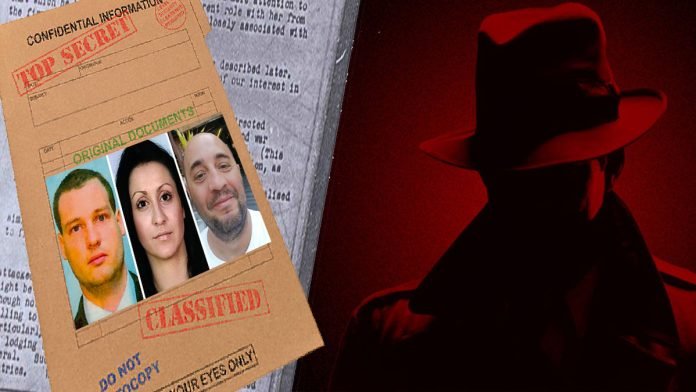
Suspected Spies for Russia: A Web of Deception Unveiled in the Heart of Britain
In the words of John le Carré, a master of espionage fiction himself, “The cat sat on the mat is not a story. The cat sat on the other cat’s mat is a story.” In the case of Roussev, Dzhambazov, and Ivanova, the narrative woven goes beyond mere mats; it’s a tale of manipulation, intrigue, and a system of deception that dares us to peer beneath the surface and question the stories that lie hidden in plain sight.
In the ever-thickening fog of global espionage, a crisp and chilling revelation has pierced through the mist: these three individuals, of Bulgarian descent, stand accused of infiltrating the heart of the United Kingdom’s national security apparatus.
Three suspected spies for Russia in the UK have been arrested and charged in a major national security investigation.
They are:
- Orlin Roussev, 45, of Great Yarmouth, Norfolk
- Bizer Dzhambazov, 41, of Harrow, north-west London
- Katrin Ivanova, 31, of the same Harrow address
The trio have lived in the UK for years, working in a variety of jobs, and living in a series of suburban properties.
Seemingly Ordinary, Secretly Extraordinary: Bulgaria’s UK Spies
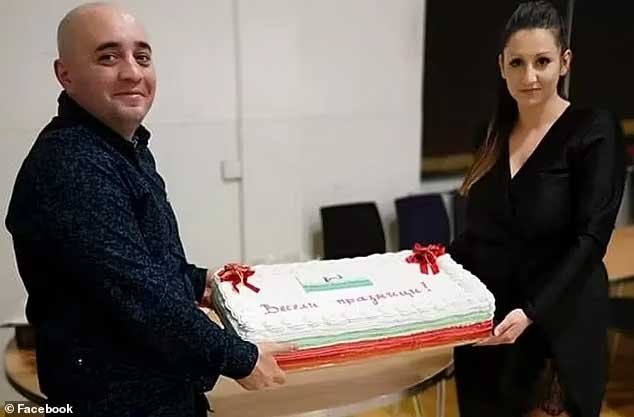
The plot thickens, the threads of subterfuge and double lives unravel, as the Metropolitan Police’s Terrorism Command boldly leads an investigation that resonates with intrigue, exposing an unsettling network of deceit and shadowy affiliations.
Like a scene ripped from a spy novel, these defendants – Orlin Roussev, Bizer Dzhambazov, and Katrin Ivanova – now find themselves in the unenviable spotlight of high-stakes international intrigue. The narrative thus far reads like a mosaic of duplicity, constructed from fragments of identity documents with an “improper intention.” The accused are purported to have clung to these counterfeit credentials, an arsenal of misinformation at their disposal, allegedly under the employ of none other than Russia’s clandestine security apparatus.
The accused, Orlin Roussev, Bizer Dzhambazov, and Katrin Ivanova, have been languishing behind bars since their arrest in February, held in custody for their alleged involvement in an audacious operation that hinges on the manipulation of identity documents. Their charges, possessing fraudulent identity documents with “improper intention,” are but the tip of the iceberg, as the sinister shadow of espionage looms over them.
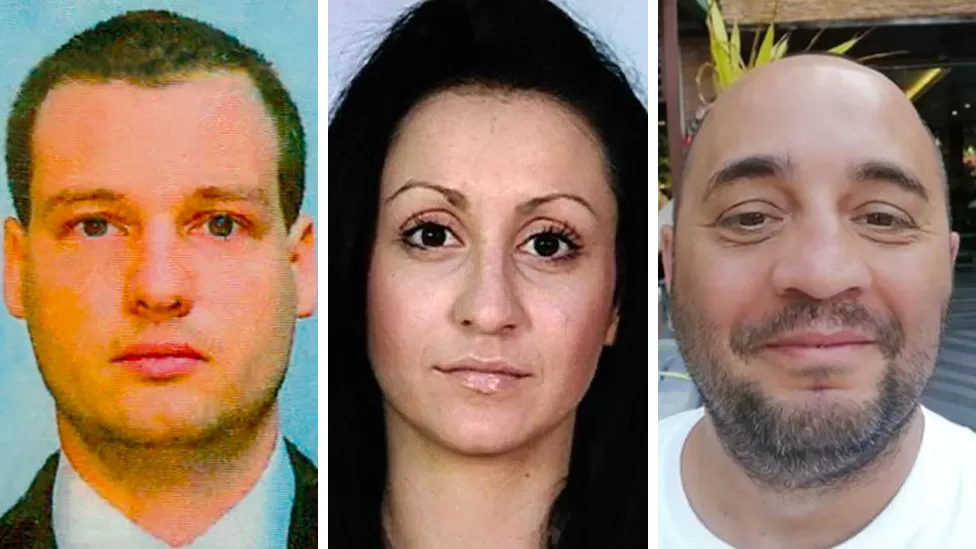
As the legal proceedings progress, the complexity of their purported activities comes to light. Allegedly working in tandem with Russian security services, the trio allegedly managed a sinister assortment of counterfeit passports and identity cards spanning across multiple European nations. The net they cast extended over the United Kingdom, Bulgaria, France, Italy, Spain, Croatia, Slovenia, Greece, and the Czech Republic, painting a picture of an operation designed to infiltrate and gather intelligence from a spectrum of European nations.
Unveiling the cloak-and-dagger nature of this case, the Metropolitan Police’s Terrorism Command is spearheading the investigation. The collaboration between counter-terrorism detectives and law enforcement agencies mirrors the gravity of the charges at hand. The layers of deception, cultivated by the accused, run deep, and the tendrils of their activities reach far and wide.
Yet, it’s the seemingly ordinary nature of the accused’s lives that provides a chilling backdrop to their alleged involvement in espionage. Orlin Roussev, who once operated in the realm of signals intelligence, trading in the interception of communications and electronic signals, had a history of business dealings with Russia. His connection to the Bulgarian Ministry of Energy, as an adviser, adds yet another layer of intrigue.
Meanwhile, Bizer Dzhambazov and Katrin Ivanova presented themselves as a couple leading a seemingly unremarkable existence. Dzhambazov, a hospital driver, and Ivanova, a laboratory assistant, might have seemed like any other suburban couple, but their ties to electoral commissions and their work familiarising Bulgarian expats with British society harbour a web of subterfuge.
The fact the government has just reviled the UK Electoral commissions website and millions of UK voter’s details were stolen shouldn’t be overlooked
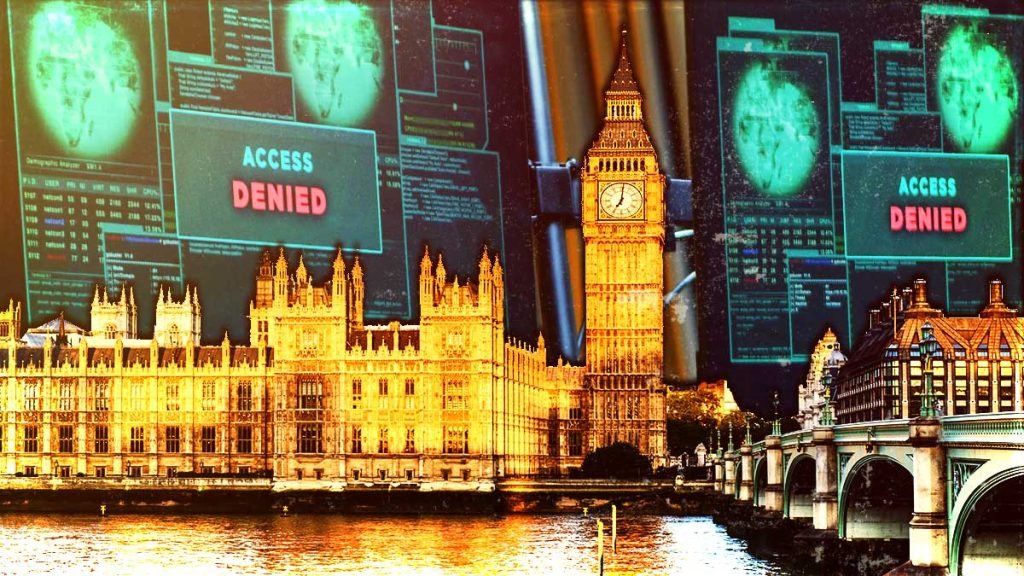
Roussev is said to have moved to the UK in 2009, originally spending three years as a technician in the financial services industry.
According to LinkedIn, he claims to have owned a business involved in signals intelligence, which involves the interception of communications or electronic signals.
He also says he has acted as an adviser to the Bulgarian Ministry of Energy.
Neighbours of Dzhambazov and Ivanova told the BBC the two were a couple, with Dzhambazov working as a hospital driver and Ivanova as a lab assistant for a health company.
They added the couple seemed normal and had previously even brought them cakes. Dzhambazov’s Facebook shows he was a fan of the British rock group Queen.
According to Companies House, Dzhambazov has also had his own business named B.I Business Investment Ltd since 2016.
Dzhambazov and Ivanova ran a community organisation providing services to Bulgarians. The group was called Bulgarian Social Platform.
The narrative of espionage is a nuanced one, woven with threads of normalcy. Their move to the UK around a decade ago, the creation of a community organisation, and their engagement with expatriate electoral processes paint a picture of individuals deeply embedded within British society. Yet, beneath the veneer of normality, lay a calculated network devoted to serving the interests of a foreign power.
As the legal drama unfolds, questions linger about the true extent of their activities and their potential impact on national security. Their trial, scheduled to take place at the Old Bailey in January, promises to lay bare the intricacies of this enigmatic affair. But it is the broader context that gives this case its resonance: a reflection of the broader challenges the UK and its allies face in guarding against covert intrusions into their institutions and the integrity of their democracy, what little we have.
The Great Game.
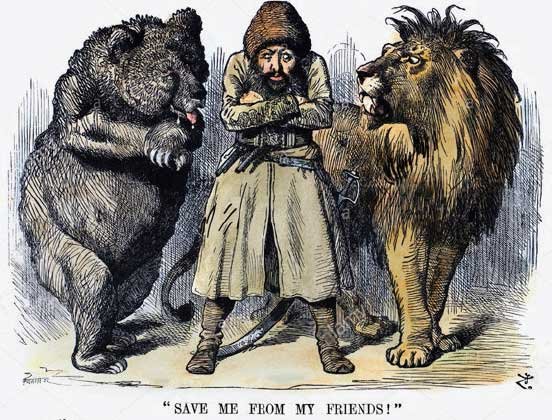
In an era when the notion of trust has been tested and torn asunder, when the lines between loyalty and betrayal blur in the shadows, the sinister tale of these suspected spies unfolds. Whether these Bulgarian figures are mere pawns or the tip of an iceberg of international intrigue, one thing is certain: in the halls of power and the corridors of secrecy, the game continues, and the stakes have never been higher.
This episode underscores the gravity of modern espionage, where seemingly unassuming individuals can cloak themselves in the trappings of ordinary life while conducting activities of profound consequence. As the dust settles on this chapter, it should serve as a stark reminder that the struggle to protect national security and sovereignty is a dynamic and ongoing one.
However, there should be no uncertainty. We now anticipate Russia’s retaliatory expulsions, as British operatives find themselves abruptly shown the door. Welcome to the realm of espionage, a contemporary landscape characterized by warfare in the shadows, economic subversion, and even insidious corruption…this is after all The Great Game…
Support Independent Journalism Today
Our unwavering dedication is to provide you with unbiased news, diverse perspectives, and insightful opinions. We're on a mission to ensure that those in positions of power are held accountable for their actions, but we can't do it alone. Labour Heartlands is primarily funded by me, Paul Knaggs, and by the generous contributions of readers like you. Your donations keep us going and help us uphold the principles of independent journalism. Join us in our quest for truth, transparency, and accountability – donate today and be a part of our mission!
Like everyone else, we're facing challenges, and we need your help to stay online and continue providing crucial journalism. Every contribution, no matter how small, goes a long way in helping us thrive. By becoming one of our donors, you become a vital part of our mission to uncover the truth and uphold the values of democracy.
While we maintain our independence from political affiliations, we stand united against corruption, injustice, and the erosion of free speech, truth, and democracy. We believe in the power of accurate information in a democracy, and we consider facts non-negotiable.
Your support, no matter the amount, can make a significant impact. Together, we can make a difference and continue our journey toward a more informed and just society.
Thank you for supporting Labour Heartlands











